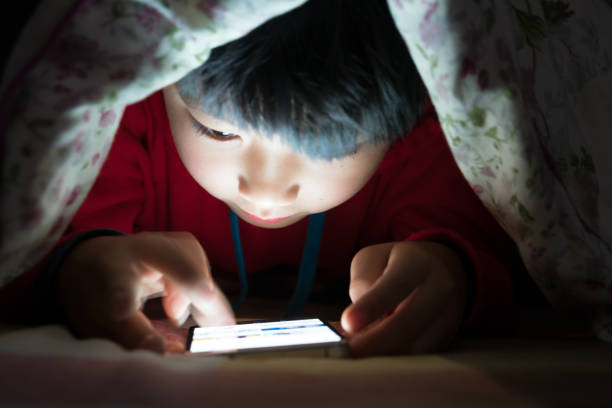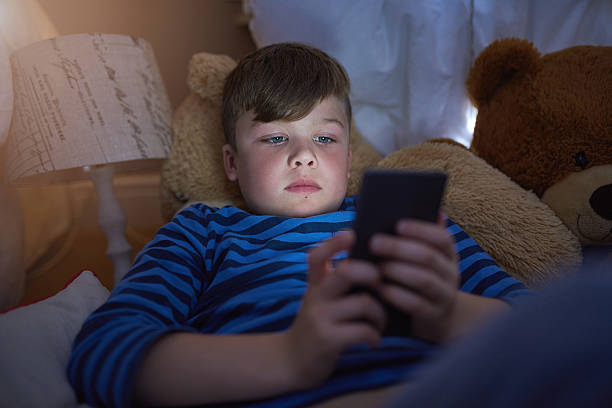Last Updated on February 22, 2025 by Mandy Gurney

The Impact of Screens on Your Child’s Sleep: Understanding the Real Issues
Mobile phones offer endless entertainment, connectivity, and information—but they can also be intrusive, keeping us up when we should be resting. This issue is becoming more prominent for children, with increasing concerns about how screen time affects their sleep.
As parents, it’s easy to spot the signs: children staying up late, having trouble winding down, or complaining about being tired during the day. A recent study of 11,875 US children aged nine to 10 explored how screen time affects mental health, behaviour, school performance, sleep, and friendships. The results indicate that more screen time is mildly linked to worse mental health, more behaviour problems, lower academic performance, and poorer sleep, but slightly better peer relationships.
Understanding the Impact of Screen Time on Sleep
While blue light has long been blamed for sleep disruptions, the latest research suggests that the real problem is more complex. The issue isn’t just the light emitted from screens—it’s how devices keep children alert at bedtime and shift their bedtimes later as they scroll through social media, play games, or watch videos.
Studies have found that the more time children spend on their phones, the later their bedtimes get and the less sleep they get overall; those children who kept their phones on at night—especially with notifications active—had worse sleep quality and stayed up later.
How Phones Keep Your Child Awake
Phones can stimulate your child’s brain, making it difficult for them to fall asleep. Instead of winding down, they’re getting caught in a cycle of watching “just one more episode” or scrolling through social media, which pushes bedtime later and later.
But it’s not just the amount of time they spend on devices that matter. The content they’re engaging with is equally important. Reading or seeing upsetting messages, or getting involved in emotionally charged content, can further disrupt their ability to relax and fall asleep. Even “fun” content can spark excitement or lead to overthinking, which makes it harder to settle down.
Setting Boundaries to Improve Your Child’s Sleep
As parents, you have the power to set healthy boundaries around screen time that can greatly improve your child’s sleep.
Here are some practical tips:
- Set Clear “House Rules” for Screen Time: From the moment your child gets their first phone, make it clear that devices do not belong in the bedroom. This helps avoid late-night scrolling and phone distractions.
- Create a Charging Station Outside the Bedroom: Keep phones and other devices in a common area, like the kitchen or living room, to prevent them from interfering with sleep.
- Lead by Example: Children are more likely to follow rules when they see their parents practising them. Limit your own screen time before bed, and you’ll set a great example for your child.
- Establish a Screen-Free Wind-Down Time: Aim for an hour or two without screens before bed. Use this time for activities like reading, drawing, or doing a relaxing puzzle to help your child wind down.
- Support Late-Night Study Needs: If your child needs to study late or use devices for schoolwork, consider having a cut-off time at least an hour before bedtime.
- Create a Relaxing Bedtime Routine: Dim the lights an hour before bedtime to signal to your child’s body that it’s time to wind down. Studies show that even just four minutes of bright light at the wrong time can delay melatonin production by up to 90 minutes, making it harder to fall asleep.
Why Leading by Example Matters
It can be hard to convince children to change their habits, especially when they’re used to having their phones at all times. However, setting clear rules and leading by example can make a big difference. If your child is already struggling with sleep, have an open conversation about how devices and screen time might be affecting their rest. Helping them understand the importance of healthy sleep habits—and supporting them in sticking to them—can lead to better sleep quality for the whole family.
For more on teens sleep, see our blogs on:
-
Back-to-School Sleep Tips
-
Why Sleep is Essential For Learning
-
Is Your Teen Getting the Sleep They Need?
-
Why Sleep is Essential for Teens’ Health and Wellbeing
-
Relaxation Techniques to Help with Bedtime
Written by Mandy Gurney. RGN.RM.Dip HV February 2025
0 Comments







